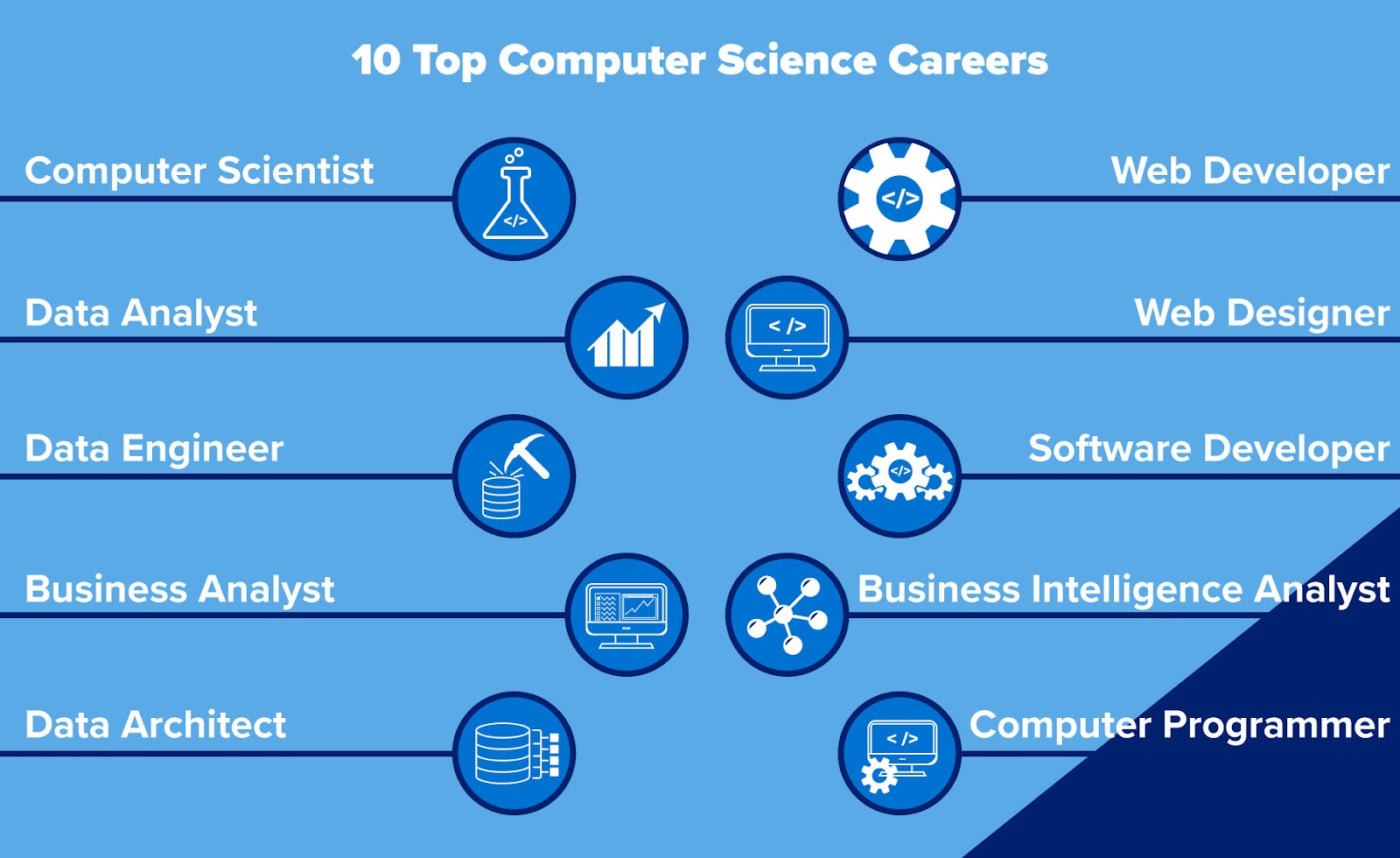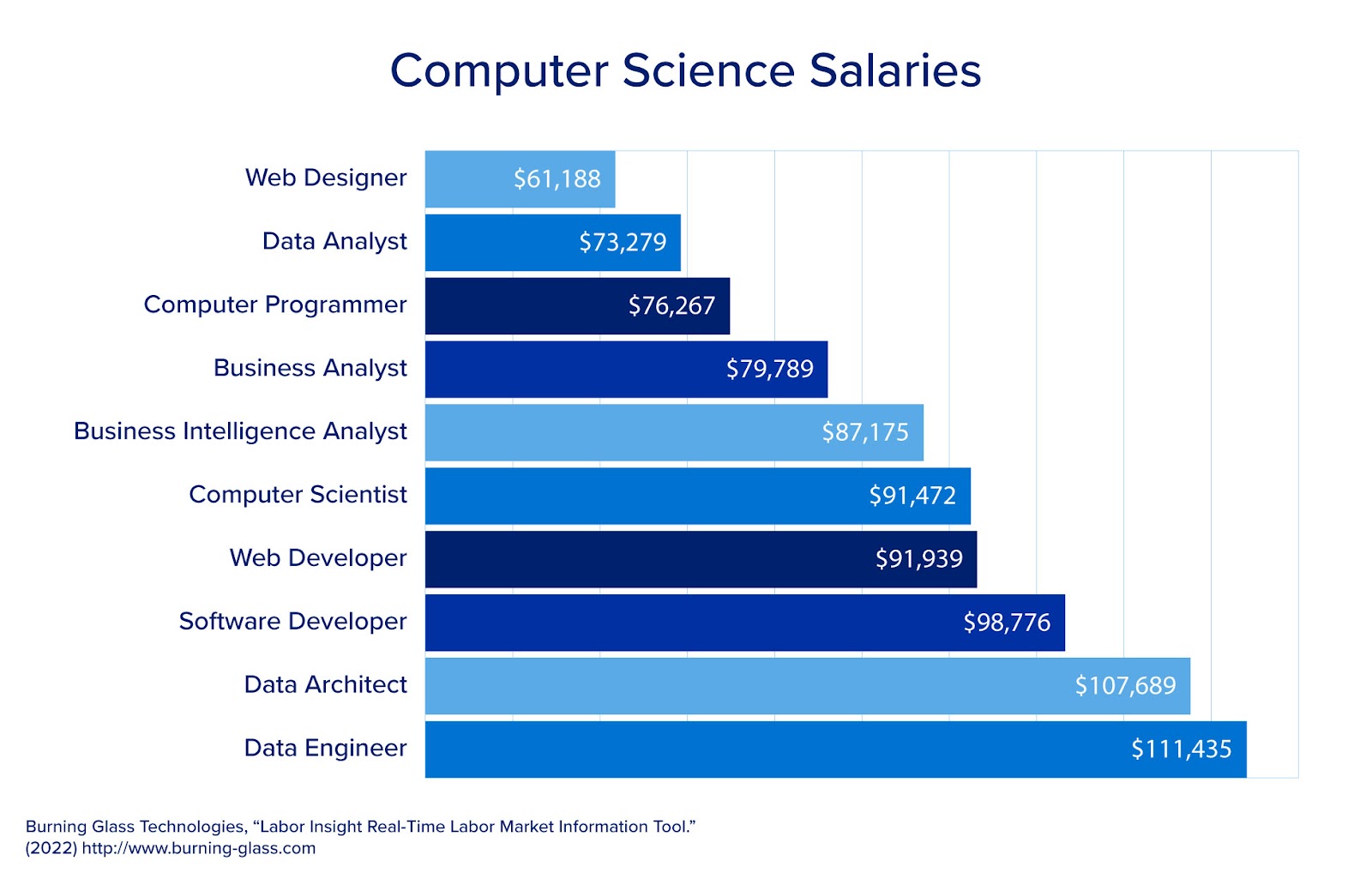Which Computer Science Career is Right for Me?
If you’re considering a career in computer science, navigating the numerous paths available can be overwhelming. From software development to cybersecurity, there are many areas to explore. In this article, we’ll look at the various computer science careers available and help you determine which one may be right for you.
Starting a career in computer science can be exciting, but finding the right fit for your skills and interests is essential. With so many options available, it can be challenging to determine which path to take. This article discusses the different computer science careers, their responsibilities, and the skills required for each.

Network Administrator
The network administrator’s responsibility is to manage and upkeep computer networks inside an organization. They ensure that users can access the network and that it operates effectively and safely. The following are some of the primary duties of a network administrator:
Network Administration is in charge of maintaining the network to ensure it operates effectively. This entails monitoring network performance, investigating problems, and applying remedies as necessary.
Network security against external threats like hackers, viruses, and malware is the responsibility of network administrators. This entails putting security procedures into place, keeping an eye out for intrusions, and performing routine security audits.
Network administrators are in charge of offering users on the network technical support. This entails solving problems, responding to inquiries, and training users.
Network Upgrades: Network administrators make necessary upgrades to keep the network operating at peak efficiency. This includes implementing new technologies, updating hardware and software, and ensuring that legacy systems are compatible.
Network administrators are in charge of documenting the network’s policies, procedures, and configuration. This documentation is crucial for auditing, troubleshooting, and maintaining business continuity.
Data Analyst
A data scientist is a specialist who mines data for information and insights using statistical and computational techniques. They employ various tools and approaches to analyze and understand vast and complicated data sets. A Data Scientist’s primary duties include things like:
Data Preparation and Collection: Scientists gather and process data from diverse sources. This entails preparing the data for analysis by cleaning, converting, and organizing it.
Data Analysis: Using statistical and machine-learning approaches, scientists analyze data to find patterns, trends, and insights. They employ programming languages like Python, R, and SQL to analyze data.
Data visualization: Data scientists use visualization tools to show data clearly. To assist people in comprehending the insights and trends concealed in the data, they produce charts, graphs, and other visualizations.
Data scientists construct models to forecast future events based on historical data. Model building and deployment. They create predictive models using machine learning algorithms and then utilize these models to generate predictions based on new data.
Data scientists inform team members, executives, managers, and other stakeholders about their results. They must be able to succinctly and communicate complicated ideas.
Cybersecurity Expert
A professional in charge of defending computer systems and networks against online dangers is known as a cybersecurity specialist. They seek to detect potential security threats, create prevention plans, and deal with any security problems that may arise. The following are some of the primary duties of a cybersecurity specialist:
Risk Assessment: Cybersecurity experts determine the threats to an organization’s networks and computer systems. They pinpoint potential security gaps, assess the probability of a cyberattack, and estimate the possible consequences of a successful attack.
Cybersecurity experts create and put into practice security techniques to safeguard networks and computer systems. They design policies and procedures to ensure security precautions are in place and adhered to by all network users.
Cybersecurity experts watch for any security flaws on networks and computer systems through security monitoring. They employ security software and solutions to identify and address real-time security events.
Cybersecurity specialists are in charge of responding to security incidents when they arise. They look into the incident, assess the damage, and take precautions to avoid it happening again.
Training and Education: To help users of computer systems and networks understand the value of security and how to defend themselves from cyber dangers, cybersecurity specialists offer training and education.
Web Developer
An expert in charge of designing, creating, and maintaining websites is known as a web developer. They strive to produce functional, approachable, and aesthetically pleasing websites. The following are some of the primary duties of a web developer:
Design: Web developers create a website’s visual elements and overall layout. They collaborate with customers and stakeholders to comprehend their preferences and demands to produce plans that satisfy those needs.
Web developers create websites using computer languages, including HTML, CSS, and JavaScript. They design the navigation, forms, other interactive components, and the website’s basic framework.
Testing: Web developers test a website to ensure it is user-friendly and operates correctly. They employ various testing tools and procedures to find and address bugs and other problems.
Web developers are in charge of managing the website and making sure it is current and runs well. They reply to user comments and requests and update the website as necessary.
Collaboration: To build and maintain websites, web developers team with other experts, including designers, content producers, and project managers. They work with these experts to ensure the website satisfies the organization’s and visitors’ requirements.
Software Developer
A professional in charge of planning, creating, and managing software programs is known as a software developer. They work on various projects, including web-based software and desktop and mobile applications. One of the primary duties of a software developer is to:
Design: Software developers are in charge of creating the architecture and features of software programs. They collaborate with customers and stakeholders to comprehend their preferences and demands to produce designs that satisfy those needs.
Developers create programs using programming languages, including Java, C++, Python, and JavaScript. They develop the application’s fundamental framework, which includes the user interface, data storage, and other interactive components.
Testing: To ensure the software application is functional and user-friendly, developers test it. They employ various testing tools and procedures to find and address bugs and other problems.
Software developers are in charge of maintaining the software application to ensure it is current and runs correctly. They reply to user comments and requests and update the application as necessary.
Collaboration: To create and maintain software applications, developers collaborate with other experts like designers, product managers, and project managers. They work with these experts to ensure the application satisfies the company’s and its consumers’ requirements.

FAQs
What are the most essential skills for a computer science career?
The essential skills for a computer science career include strong problem-solving skills, programming skills, computer systems and network knowledge, and the ability to learn quickly and adapt to new technologies.
How do I determine which computer science career is right for me?
To determine which computer science career is right, consider your interests, skills, and career goals. Research each field thoroughly and talk to professionals in the industry to gain a better understanding of the day-to-day responsibilities and required skills.
Is a degree necessary for a career in computer science?
While a degree is not always necessary for a career in computer science, it can help gain the skills and knowledge needed for the field. Many employers prefer candidates with computer science degrees or a related lot.
What types of industries hire computer science professionals?
Computer science professionals can work in various industries, including technology, healthcare, finance, and government. Many businesses and organizations rely on computer systems and networks, putting computer science professionals in high demand.
What are the salary expectations for a computer science career?
Salaries for computer science professionals can vary depending on the specific career and industry. However, many computer science careers offer salaries well above the national average, with opportunities for advancement and increased earning potential over time.
Which is More Important for a Career? | 10 Things You Should Know
Conclusion
There are many different computer science careers, and each requires a unique set of skills and knowledge. Whether you’re interested in software development, cybersecurity, or data science, it’s essential to thoroughly research each field and determine which is the best fit for you. With the right skills and knowledge, you can build a successful career in computer science.

















